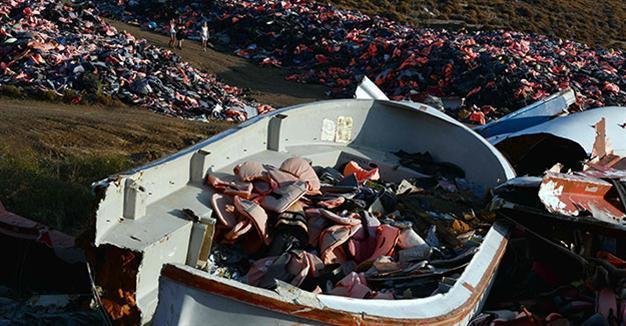Migration arrivals inch up after failed Turkey coup: Greece
ATHENS

Tourists visit the dump above the village of Molyvos with thousands of lifejackets next to boats collected from the shores, evidence of last year's refugee crisis on July 18, 2016. AFP photo
Migrant arrivals in Greece have inched up in the past two weeks after a failed coup attempt in neighboring Turkey, government figures show.
The average rate has increased to 90 people a day, compared to 30 before the attempted coup, according to the data.
“For the moment, there is no concern on our part,” a Greek government source insisted on July 28.
“We are following the situation closely and are vigilant... this could be a temporary increase,” the official told AFP.
At the height of the migrant crisis last year, thousands of people would land every day on Greek Aegean islands close to the coast of Turkey.
Most were allowed by Greece to continue their journey northwards, prompting an outcry among several European states that hastened to shut their borders earlier this year.
An EU-Turkey accord in March succeeded in stemming the flow, but there are fears in Greece that this deal could unravel after the failed July 15 coup attempt.
A purge in Turkey has seen over 8,000 arrests among the army, the police and judiciary, and hundreds have lost their jobs in every major Turkish ministry following the failed coup attempt.
Three days after the attempt on the government, a group of Turkish officials assigned to monitor the migration deal on the Greek side returned home, and have yet to be replaced.
Over 57,000 mainly Syrian refugees and migrants from other nations are currently trapped in Greece.
Over 9,000 of them arrived after the EU-Turkey deal took effect on March 20, many of them eligible for deportation under its terms.
But fewer than 500 people have been returned so far as thousands have submitted asylum applications in Greece to block the process.
Within the scope of the Turkey-EU accord, Turkey would help curb the flow of migrants from Turkey into the EU in exchange for the EU granting Turkey a total of €6 billion to be used for the Syrian migrants in Turkey.
On the Turkish side, police caught a total of 235 migrants from Afghanistan, Iraq, Pakistan and Syria in Turkey’s three western provinces – Edirne, Tekirdağ and Kırklareli. All three provinces lay close to the country’s borders with Greece and Bulgaria.
Meanwhile, the Danish People’s Party, an anti-immigration and nationalist group that supports the center-right government, said Denmark should halt immigration from Muslim countries, citing the threat of violence from Islamic extremists, the Associated Pres reported.
In an interview published July 28, the party’s deputy leader Soeren Espersen told the Berlingske newspaper that Muslim migrants should be barred from entering Denmark for four to six years because “we need a respite after recent terrorist attacks in Europe.”
Martin Henriksen, another senior party member, confirmed to Denmark’s TV2 that it was the group’s stance.
Critics including the opposition Social Democrats lashed out at the proposal, saying it wrongly conflates mainstream Muslims with Islamic extremists and compared it to Republican presidential candidate Donald Trump’s plan to ban Muslims from entering the U.S.
Social Democrat lawmaker Lars Aslan Rasmussen, whose father is Muslim, said the Danish People’s Party’s position amounted to “religious discrimination, religious apartheid. ... It’s far out.”
Martin Henriksen, the Danish People’s Party immigration spokesman, told The Associated Press that his party - which supports Denmark’s year-old minority government but holds no positions inside it - would not seek a law explicitly banning Muslim immigrants, but that would be a primary goal.
